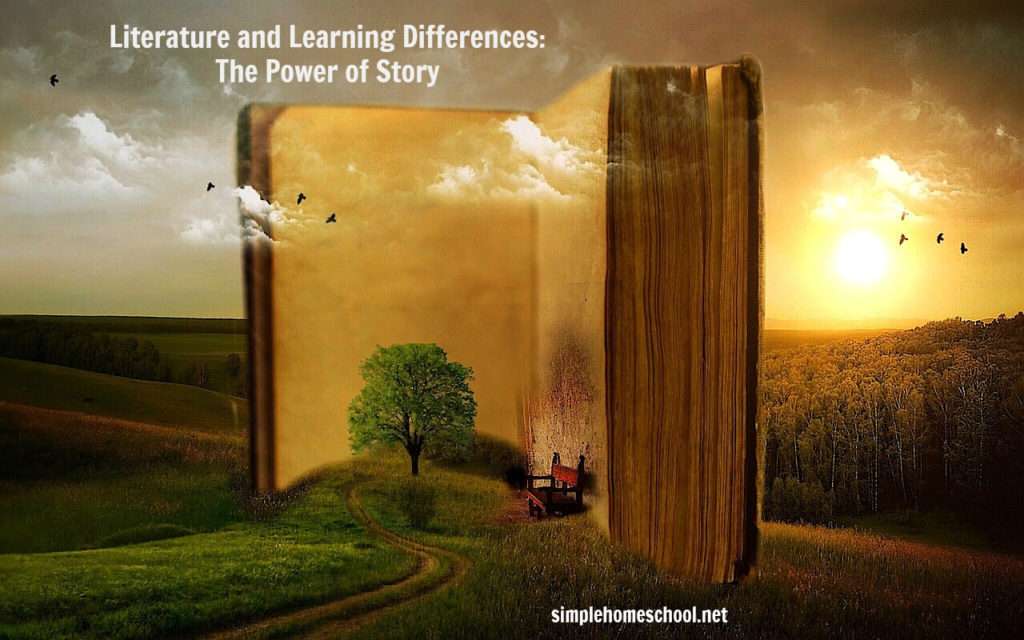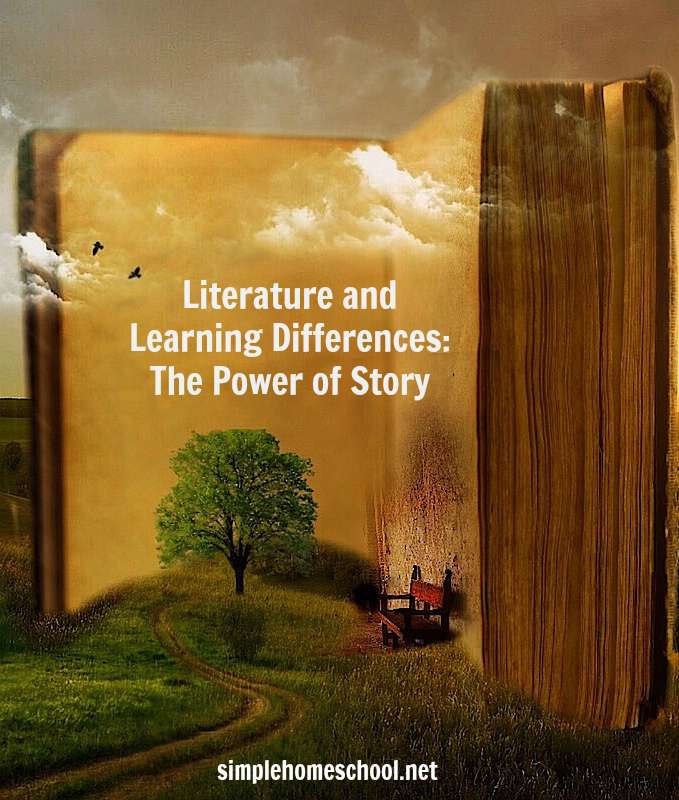Literature and Learning Differences ~
Written by Shawna Wingert of Not the Former Things
For years, I have felt like a read aloud failure.
I love books. I worked in the library all through college, and spend far too much money buying books on Amazon because they will deliver them to my door in just two days time. My boys, however, do not have the same relationship with books.
Over the years, I have adjusted my expectations. We use Audible (afflink) liberally.
I allow my boys to choose books that some families might consider frivolous.
We even stopped going to the library every Wednesday when it began to feel like a chore. (My heart hurts just typing this. I was the one who loved our Wednesday afternoons in the stacks the most.)
No matter how hard I tried, I just couldn’t meet the ideal I had in my own mind about how literature should work in our home and education.

My boys have significant learning differences that effect almost every aspect of how they learn and how I teach. Both are dysgraphic and my youngest is also profoundly dyslexic.
Necessarily, over time, I have learned that the best way to engage them in learning is through story, despite their resistance to traditional, more formal literature requirements. (Incidentally, I think this may be true for all of us – but it is essential for my kiddos.)
Moreover, the more I have let go of the list of books I thought were important for us to read and allowed their interests and personalities to guide our choices, I have learned one very important lesson –
Literature can make a significant impact on children with learning differences.

My children struggle to feel comfortable in a world that seems to focus on their differences rather than their strengths. They see what our culture celebrates, and what the definition of success looks like for children their age. They know they cannot compete.
It’s discouraging, at best. Demoralizing and depressing at its worst.
Finding books that center on and even the celebrate the different ones, the outcasts, and the kids with unusual talents and strengths, is one to the best ways I know to counteract this negative messaging.
It also exposes them to themes that include overcoming adversity and using your own strengths to succeed – something they both need to master in order to function well as adults in our world.

Over the past year, we have listened to the following books on audio:
- The 39 Clues Series (afflinks)
- Harry Potter – All 7 of them
- The Percy Jackson Series (which led to an entire year’s study of Ancient Greece)
- A Series of Unfortunate Events
- The House With A Clock In Its Walls
- Miss Peregrine’s Home For Peculiar Children
All of the above are written about children with differences, some specified like dyslexia and ADHD, others inherent in the story. My boys innately understand these main characters. They experience the story with a much greater connection than I do.
Most importantly, these books have become foundational in our approach to learning in every other subject, too. Here’s how.
Literature and Learning Differences: The Power of Story
Story provides illustrative examples.
We spend a lot of time practicing certain therapeutic approaches, including social skills and behavioral therapies. The most effective way I have found to make these exercises “stick” for my boys is to provide examples from the books they’ve read.
For example, when my son is feeling anxious or depressed, we talk about how Harry had to think about his best memory ever, in order to combat the Dementors. Or when it was tough for Zero to read in Holes, he practiced with his friend in ways that were more fun.
These illustrative examples make the concepts we are practicing much more concrete and accessible for my boys.
Story increases my sons’ ability to be adaptable in their own thinking.
Both of my children are blessed with strong personalities and opinions. Sometimes this works to their benefit. Sometimes it can lead to rigid thinking and inflexibility.
The stories they love and even commit to memory tend to counteract this rigidity. Because they love the characters, my sons are more willing to acknowledge that their choices in the story, while different from one my boys might have made, were nonetheless valid and helpful.
The more stories they commit to memory, the more I find they draw on the examples within them to explain behaviors that were previously confusing or frustrating in everyday life.
Story can emphasize success despite the odds.
Because all of the stories we have read (listened to) together thus far have had some measure of happy endings, we often talk about them when life feels difficult. These stories provide a reminder that when it’s tough, we persevere, even against the most difficult circumstances.
This approach helps my children to keep trying, despite their differences, and is much more effective than their mom encouraging them not to give up.

When I think back on how I used to feel about our approach to literature (or lack thereof) I realize so much has changed. Those expectations and ideals were less about the outcome for my boys, and more about me expecting my sons’ education to resemble my own.
Stepping back and allowing my kiddos to learn in the ways that work best for them has actually produced far greatest results than I could have possibly imagined all those years ago.
My kids love books. They apply them to their lives. We discuss them in interesting and engaging ways.
What more could this nerdy, book-loving mom ask for?
Shawna has a new FREE resource available for Simple Homeschool readers – Helping A Struggling Reader: Practical Answers For Parents.

You can do this. Your child can do this. These real-life, practical recommendations not only help your child learn to read, but also help you enjoy life together along the way.
Have you seen the power of story help your children in some way? Please share!
This post contains affiliate links, which means a small commission is generated from some of the links on this page.
What’s Your Homeschool Mom Personality? Take Jamie’s quiz now and receive a free personality report to help you organize your homeschool based on what your personality type needs most!



 FREE BOOKS! Today’s best Kindle freebies/deals for your family
FREE BOOKS! Today’s best Kindle freebies/deals for your family
I hate reading aloud but I do it. My kids have stopped reading on their own. I thought maybe it was a teen thing. We stopped doing the library each week as well. I read 2-3 books a month and started to wonder what I did wrong. Thank you for sharing <3
Jen’s latest post: 5 Steps For Organizing Your Planner For The Week & Get Things Done!
Oh Jen! I am glad I am not the only one who experienced the loss of the library. It really has been an adjustment, but it’s working. Thank you so much for taking the time to comment. 🙂
Thank you for sharing this story. That is the power of homeschooling and being able to protect them from schools that would not value their differences.
I am so grateful that we made the decision to homeschool. I cannot imagine what my boys would face, had we continued in the school system. Even more than that, I am grateful that we have time to really celebrate their strengths, instead of always focusing on their weaknesses.
Thank you for this. I’ve hit a rut with my son, a struggling reader. I needed some encouragement and I found it here. Sometimes this mommy needs to be told everything is going to be okay too.
We all need to hear it, especially in the seasons when our kiddos are struggling. I am so glad you found it encouraging!
My son is dyslexic (dyscalculic, dysgraphic), too, and we have done the exact same as you have–used audio books liberally, ‘candy’ books instead of literature, and of course soo many comics. He LOVES stories. He has always been able to sit and listen or play and listen to a story, and get all the content, so I didn’t really worry about it. I have a degree in English (aren’t our stories ironic in the best way?!) and it’s really stretched me on how to think of the existing box. My little thinkers and artists are so creative and would absolutely call themselves Big Readers and that is all that matters to me! I haven’t read any of the Riordon books myself but my two have each read them 1-2+ times a piece!
I totally get what you’re saying with the strong opinions/wills. Oy. I I love using the characters (our kids like the same books!) as jumping off points like the example you gave with Harry and the dementors. I need to think on that some more. Excellent post!
This post really, really hit home for me. I, too, loved our library days, but I just don’t drag her there anymore. It’s torture for my 10yo dyslexic. But she LOVES stories. I could read aloud all day to her and she’d would be over the moon. We’re n Harry Potter now and looking forward to Percy, even though I didn’t love book 1 myself (not enough girls/women and those present aren’t rounded enough — does this improve in the sequels?). This post really spoke to me and I needed to hear it today. Thank you. I’ll be following you on Instagram and FB now!